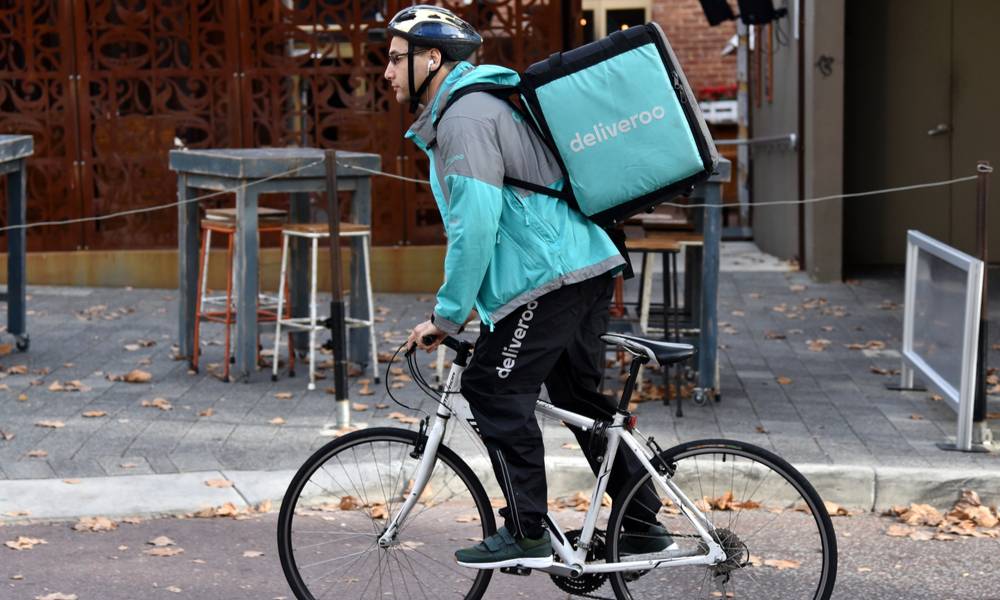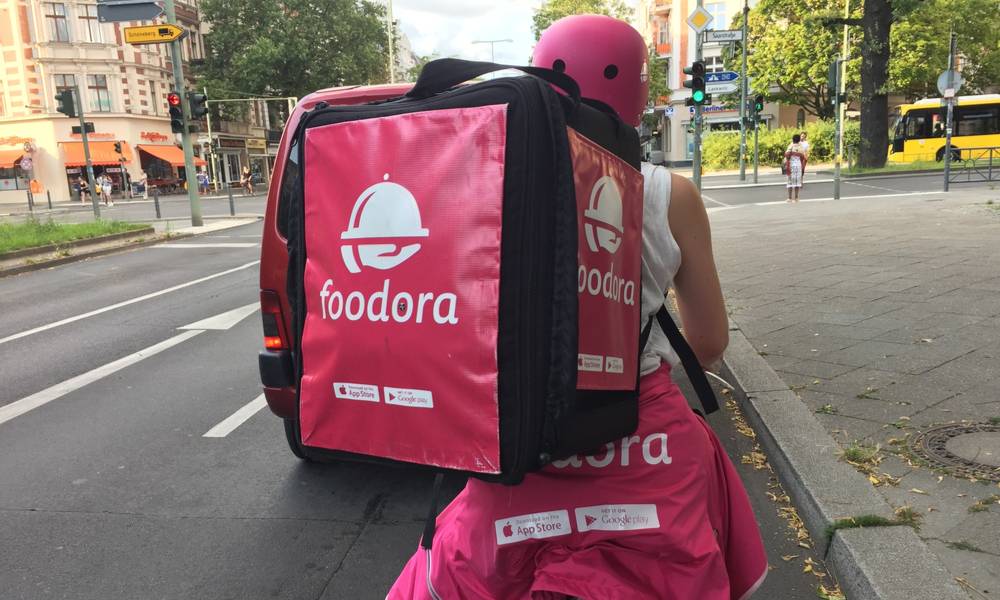Price of a life: why food delivery services need a regulation overhaul
Governments are scared of appearing business ‘unfriendly’ by intervening in the gig economy and UNSW Sydney experts believe a number of important steps need to be taken to protect an emerging underclass of workers
In 2020, restrictions put in place to slow the spread of COVID-19, including the shutting down and curbing of non-essential services such as eating in at restaurants, cafes and bars, accelerated the demand for home deliveries. As a result, food outlets across the nation turned to takeaway and delivery services to make up for lost revenue.
This was good news for food delivery platforms such as Uber Eats, Hungry Panda and Deliveroo. Close to 20 per cent of Australians utilised food delivery services last year, and the sector generated $2.7 billion in revenue, according to Statista. While Uber reported a $1.78 billion loss in August, its food-delivery business outshone rides for the first time – revenue in deliveries jumped from $819 million in the first quarter to $1.2 billion in the second. Meanwhile, Deliveroo announced it had generated a profit for the first time – moving into the black in the second and third quarters of 2020. However, the full details of its 2020 financial performance are unlikely to be released until later this year.
Responding to the surge in demand, food delivery workers took to the streets en-masse – often with only a bike and a helmet – to feed a new base of hungry homebound customers. But at what cost?

Five food delivery deaths in two months
Late last year, five delivery riders' deaths only weeks apart (four of which happened in Sydney) reignited calls for an overhaul of Australia's gig economy wages and working conditions. Uber Eats employed two of the drivers killed in Sydney, and the company admitted the industry needed to do more to improve worker safety for its workers.
Under the NSW workers' compensation scheme, dependants of someone who has died due to work-related injury are entitled to a lump-sum payment of $834,200, and weekly payments of $149.30 for each dependant child until the age of 16. But Uber Eats provides its own insurance policy for workers, giving dependants a maximum of $400,000 as a lump sum, and potentially $5000 to an individual spouse or dependant child.
Responding to the fatalities, the NSW Government set up a taskforce to investigate the accidents. Led by the SafeWork NSW and Transport for NSW, the taskforce will consider whether there were any avoidable risks that may have contributed to the workers' deaths.

Is regulatory intervention needed?
Adding to the safety risks, workers in the gig economy have to deal with labour insecurity, and many are just getting by on low wages. Food delivery drivers and riders often earn less than the minimum wage. A survey conducted by the Transport Workers' Union in September last year, for example, found that food delivery workers earned an average of just $10.42 an hour after costs. This in contrast to the national minimum wage for casual employees of $24.80 per hour.
Indeed, food delivery workers are often particularly vulnerable, and the sector is characterised by a workforce that comprises typically low-skilled, young workers with a migrant background, says UNSW Law & Justice Lecturer Dr Alice Orchiston. “Regulatory intervention is needed to protect gig workers from exploitation,” said Dr Orchiston, who noted that 8.1 per cent of Australian workers (around 1 million people) are independent contractors – many of whom work in the gig economy.
Due to COVID-19, Dr Orchiston observed there is increased competition for jobs, leaving workers with less bargaining power than if there were better economic conditions and more jobs. “They are typically offered work on ‘take it or leave it’ conditions and their contracts typically permit the gig platform to unilaterally change the terms of the contract.”
This places people at significant risk of exploitation because they are classed by the law as ‘self-employed’ and have no safety net of minimum conditions, Dr Orchiston said. “If the gig platform wants to increase its commission by reducing the workers’ pay – for example, by reducing the rate the worker receives per delivery – it can.”

Greig Taylor, a lecturer in the School of Management at UNSW Business School, describes this kind of precarious work as dehumanising and he said it will increasingly emerge as one of the modern evils of society unless something is done to regulate it. “The shift towards more precarious and temporaneous work is a symptom of modern capitalism in liberal market economies,” he said.
Crises such as the GFC or COVID-19 simply provide an opportunity for companies to speed up and justify rationalisation of workforces, and the manner in which workers are engaged by proxy, said Dr Taylor. “The contemporary economic model in countries like Australia places the needs of the shareholder far above and beyond those of other stakeholders, and this results in a perverse emphasis on profit maximisation at all costs, without any acknowledgement of how this affects people and society more broadly.”
The gig economy (and reticence to regulate it) is just another manifestation of this, according to Dr Taylor, who said governments are scared of appearing unfriendly to businesses by intervening in the market. Big companies sometimes use this to their advantage to oppose any changes to the law which might better protect this emerging underclass of workers, he said.
The courts can only do so much
Despite this, the Fair Work Ombudsman has taken up several court cases, most notably against Uber Eats in April 2020 and Foodora in November 2018. “In the case of the latter, the company decided to cease trading in Australia, rather than countenance accepting their workers being categorised as employees,” said Dr Taylor.
However, leaving this issue to the courts to assess on a case-by-case basis is not a sustainable approach, and Dr Greig said that sooner or later the government will have to intervene to classify gig workers on the employment spectrum.

“However, the current administration has a history of siding with employers over workers, so it is difficult to see where meaningful change will occur,” he said. “Clearly, the world of work has faced significant disruption in recent years and the law needs to adapt to take this into account, otherwise vulnerable categories of worker will continue to be exploited through underpayment of wages and denial of basic employment rights.”
Collective bargaining to improve workers' rights
Dr Orchiston said the federal government should enact the ACCC’s draft independent contractor bargaining ‘class exemption’ (Competition and Consumer (Class Exemption— Collective Bargaining) Determination 2019) which would make it easier for independent contractors to bargain collectively to improve their pay and conditions – without the risk of breaching competition law.
“Additional safeguards are necessary to give independent contractors more bargaining power in this process: they need to be protected from adverse action taken in retaliation by the business that they are bargaining with and they need to be able to engage in collective boycotts,” said Dr Orchiston.
She added a federal inquiry into the exploitation of gig economy workers is necessary as some of the existing legal framework is federal and cannot be addressed on a state-by-state basis. “One reform that this inquiry could consider is inserting a deeming provision into Australia’s federal workplace law – the Fair Work Act 2009,” she says.

The deeming provision could classify certain independent contractors (such as gig platform transport and food delivery drivers) to be employees for the purpose of the Act. “This would extend minimum employment conditions to these workers, including the right to be paid a minimum wage."
Dr Orchiston said gig workers lack a number of protections under the law:
- Contractors have no right to collectively bargain to achieve better pay and conditions. Currently, if a group of independent contractors want to collectively negotiate with a business that hires them, they have to obtain formal approval from the ACCC or they risk breaching competition law.
- They have no entitlement to be paid the legal minimum wage, as this only applies to employees, so gig workers can be paid well below this. They are responsible for their own tax and superannuation.
- They can’t challenge being unfairly sacked. And the ease with which they can be terminated is a powerful disincentive against challenging unfair labour practices.
- They don’t have access to worker’s compensation if injured on the job.
- They have very little in the way of legal protections. Because independent contractors are considered to be self-employed, this is largely dealt with under commercial law and gig workers are not protected by labour laws.
Dr Alice Orchiston is a lecturer at UNSW Law & Justice, and Greig Taylor is a lecturer in the School of Management at UNSW Business School. For more information, please contact Dr Orchiston or Dr Taylor directly.
